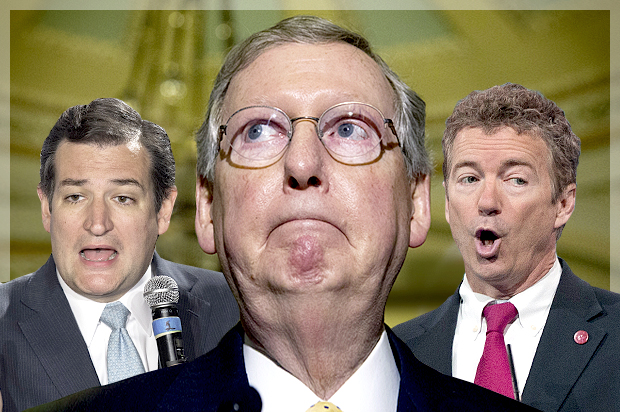The Republican-controlled Congress’ budget extravaganza continued this week as the Senate GOP released their FY2016 budgetary framework. It differs significantly from the House Republicans’ budget proposal and there’s going to be a long and difficult battle between the two competing camps to hammer out a single plan they can all agree on. And while the House budget borrowed heavily from the Paul Ryan school of achieving balance through cutting and privatizing social programs, the Senate budget takes a slightly different approach: magic voodoo savings.
This difference is most readily apparent in the way the Senate budget approaches Medicare. The House Republicans have a plan for restructuring Medicare: they want to transform it into a voucher system and cut roughly $150 billion from the program over 10 years. The Senate plan also has some changes in store for Medicare: its authors promise to reduce Medicare spending by some $400 billion over the next decade, and to protect “Medicare from insolvency, extending the life of the Medicare trust fund by five years.” What the plan doesn’t do is explain exactly how any of this will happen. They just sort of throw it out there and suggest that the relevant committees will figure out a way to make it happen. “You won’t find specifics in what we’ve done, just limits,” Senate Budget Committee chair Mike Enzi said yesterday. So they’ve got the ends locked down, just not the means.
With regard to the Affordable Care Act, the Senate indulges in a bit more budget trickery that conjures trillions of dollars in revenues out of nothing. Like the House budget, the Senate plan calls for the complete and total repeal of Obamacare. However, it also achieves balance by assuming that the tax revenues the Affordable Care Act will bring in will still exist, even after the law is repealed. How can they make this assumption? Here’s the New York Times:
Then there is the $2 trillion in tax revenues assumed even after the repeal of the healthcare law that produced the taxes. Republican aides said nothing in the budget precluded the Finance Committee from producing an overhaul of the tax code this year that would bring in that revenue without the health law.
But nothing the in the budget orders that overhaul either.
Hooray for magical thinking! The Senate budget is premised on the notion that nothing is impossible if you believe hard enough. And, as National Journal’s Sarah Mimms pointed out, earlier this week Enzi had criticized the House GOP for using this very same accounting “gimmick” in previous budgets. So it seems he’s a late convert to the budgetary dark arts.
The differences between the House and the Senate documents reflect the differing political realities the Republican majorities in each house face. The Senate GOP understands that its majority could be a short-lived one – the 2016 Senate map is about as bad for Republicans as the 2014 map was for Democrats. As such, they’re not super eager to hand Democrats ammunition in the form of staunchly conservative budgetary policies, like the Paul Ryan-inspired Medicare voucherization scheme. (Republicans remember how badly Democrats hammered Mitt Romney and Paul Ryan in 2012 for wanting to “end Medicare as we know it.”)
The House Republicans, on the other hand, don’t have to worry about losing their majority any time soon, so they’re free to put forward whatever cockamamie safety net-shredding ideas they want, secure in the knowledge that incumbency and gerrymandering will insulate them against any sort of backlash. The only real danger for them is voting for a budget that isn’t conservative enough, as that cracks open the door for primary challengers to accuse them of being RINO sellouts. The next few weeks will be consumed by the now-familiar drama of Republican congressional leaders trying to balance the passions of their conservative wings with the practical realities of governing.
But really, the GOP is under zero obligation to pay even the slightest homage to budgetary reality. What the Republicans are really fighting over is the finer contours of a document they fully expect to fall victim to President Obama’s veto pen. The budget process is entirely about sending a message to voters that the Republicans are competent enough to perform the rudimentary functions of government, and will actually be able to repeal the Affordable Care Act if they can win the White House and hold on to their Senate majority. The actual numbers don’t matter so long as they can get the politics right.

